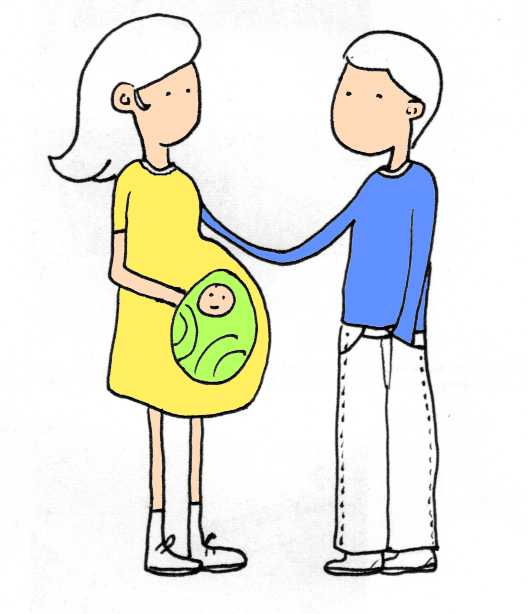A Child is Born
“Dear Family – Sound the fanfares – pop the corks: a son has been born – he entered the world at 03.52, weighing in at 3,460 gr and 53 cm height. Parents happy, relieved and joyous, now fighting with tiredness.” This was a text message announcing a new life to the family.
The birth of a baby awakens many feelings and emotions – joy, relief, and happiness but also anxiety, fear, and apprehension. Maybe the birth has been difficult, even life threatening; it could be unwanted and dreaded and can arouse many different feelings.
“I fell in love with my baby right from the start,” said Andrea. “I could spend hours just looking at him and loving him.” For Sally, it was all she had ever dreamt about: “I so wanted that baby, I could hardly believe it was true – I was out of this world.”
“I loved being pregnant,” mused Penny, “and could have gone on being pregnant forever. Yet when she was born, I was overwhelmed and could hardly believe my eyes.”
When I gave birth, I was aware only of the miracle of my babies. I was overcome with pity for that tiny vulnerable baby, entirely dependent on me, and I burst into tears. It was only many years later, when I was present at my grandson’s birth, that I was able to experience the wonder and mystery of birth itself. Not caught up in the daily grind of childcare, a grandmother has time to watch the miracle of how a little baby develops slowly stage by stage into a little person.
Hormonal changes in the mother straight after birth can make her feel weepy, sad, and depressed, yet ecstatically happy and unable to think straight. She is on a constant, emotional rollercoaster ride, unprepared and feeling incompetent. Hormonal changes in the father, which kick in at the time of his partner’s birthing experience, make him gentler and more understanding, protective of his new life, and able to put Baby first.
Parents find the birth of their baby, especially the first, changes them forever from being a couple to being a family. They change from “I” people to “We” people, basing all their decisions and plans on their baby’s needs. Books, birth preparation classes, and the medical profession advise preparing for the birth, but preparing for the many changes after birth are not always adequately covered. Few new parents give serious thought to Life after the Big Day, and consequently are overwhelmed und unprepared by daily life post birth.
Once Baby is born, the relationship becomes physical and immediate. A baby’s sole instinct is to survive, and he will send out unmistakable signals to obtain immediate and undivided attention from his mother. A newborn’s cry is so programmed that a mother feels compelled to drop what she is doing and attend to her baby. Some mothers at birth are hit by a powerful surge of love and the overwhelming need to protect their newborn; others feel very detached, and many feel that the baby does not really belong to them. All these feelings are natural and normal, and in time the mother’s relationship will change and become more moderate.
A mother’s relationship with her children is constantly changing. It starts at conception and continues throughout her entire life. Some mothers talk to their babies in the womb, communicating their innermost wishes to their unborn infant, arranging their daily schedules to accommodate Baby’s active periods, and they sing and play special music to the baby. They are full of hopes and desires, yet fearful of what is to come.
Others who are unhappy about an unexpected pregnancy may communicate negative feelings, and their mothering relationship may take more time to develop or might never develop very strongly.
“I looked at him lying there and thought, anewmode.com ‘Is this what I really want? How am I going to cope? Will it ever be the same again?’” recalls Doris.
A birth does not always mean wonder or happiness. Some babies suffer acute birth trauma, experiencing pain, fear and extreme shock during their birth journey. They are confronted with a cold, brightly lit and noisy world, so different from their cosy, warm, dark womb existence. This may explain their need for long bouts of crying. Christina Hurst-Prager, Swiss La Leche League leader and craniosacral therapist, has worked with Karlton Terry, an expert in this field, and her next book will delve into the baby’s need for crying.
Mathew Appleton, a registered craniosacral therapist and psychotherapist working in Bristol, in the U.K., promotes awareness of pre- and perinatal consciousness. He poses the idea that birth may be painful for the baby as well as the mother. As most of the pain for mothers is caused by the contact of the baby’s head and shoulders with the cervix and the bones of the maternal pelvis, it is surprising that so little attention is given to this experience of the baby and what the consequences could be. Just consider how soft and thin the bones of the baby’s cranium are, compared to the hardness of the mother’s cervix and pelvis.
Asked about how she felt on becoming a mother, Karen said, “It’s so simple; that’s what we are here for. Now I understand why I am a woman. It’s the best thing that has happened to me, perhaps even more so than getting married.” Caroline put it even more simply: “Thank God that’s over” (referring to the birth). “Now I feel absolutely fantastic.”
For more information about pre- and perinatal consciousness:
By Joanna Koch
Joanna has been involved in Mothering Matters since the beginning. She is a mother and grandmother as well as a La Leche League leader.
Illustration by Ivy Kwok Hieber
Ivy has been an Illustrator for Mothering Matters since it appeared in a printed format.





